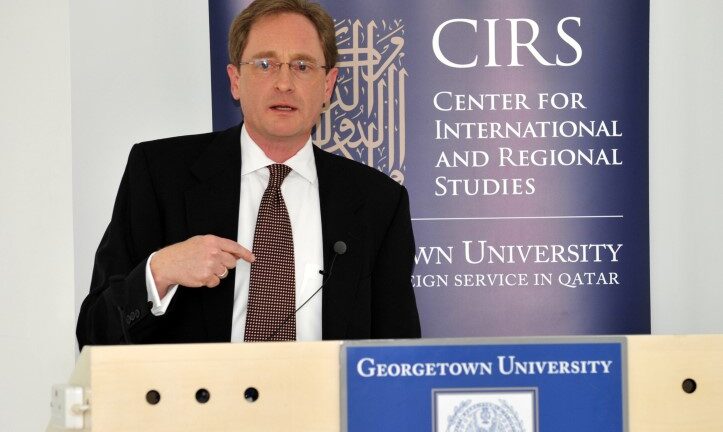Dialogue Series, Environmental Studies, Race & Society
Daniel Stoll Lectures on the Jordan River and the Johnston Plan

Daniel Stoll, Assistant Dean for Academic Affairs at Georgetown University’s School of Foreign Service in Qatar, delivered his lecture, “The Jordan River and the Johnston Plan: Lessons for the Obama Administration?” on February 8, 2010, as part of the CIRSMonthly Dialogue series. Dr. Stoll, an expert on the United Nations and multilateral organizations as well as U.S. foreign policy in the Middle East, formerly served as a Foreign Service Officer with the U.S. Department of State.
Stoll spot-lighted the issue of water scarcity in the Jordan River basin and its relation to the on-going Arab-Israeli conflict. According to Stoll, “In the West Bank the average individual has access to only 50 liters of water a day. That’s below the World Health Organization recommended amount of 150 liters per day.” He cited strained resources as one of the most persistent problems facing the embattled region and pointed to the U.S.-led Johnston Plan of the 1950s which sought equitable allocation of water to all parties as a possible template that the Obama administration might use to manage the situation today.
The president’s 2009 speech at Cairo University, the appointment of George Mitchell as the United States Special Envoy to the Middle East, and his address to the UN General Assembly in September 2009 are all signals, according to Stoll, that Obama and his administration are willing to actively engage on Middle East issues. The great strain that has been placed upon the Jordan River to sustain various populations remains contentious. Stoll pointed out that the problem is not a solely environmental one, noting, “I think it would be impossible to develop a water strategy without recognizing the broader political implications of the conflict, in particular those final status issues of refugees and borders.”
The demands currently placed on water from the Jordan River are far outstripping its sustainable usage rate; by the time the river’s flow reaches its endpoint at the Dead Sea, 90% of its water has been extracted. Agriculture, though only a uniformly minor proportion of GDP in the region, places the largest strain on river resources due to the preponderance of water-intensive crops grown in the region, such as citrus fruits and bananas. In Jordan, 65-70% of water allocated to the nation is used for farming, likewise 70% of the water available to Palestinians in Gaza and the West Bank is used on crops, while Israel expends 65% of their allotment similarly. A population boom in Jordan and the Palestinian Territories has not helped the already-strained water resources, nor has the inefficient infrastructure used to distribute water in the region.
The most controversial dimension of the water scarcity issue in the region centers around existing inequities in both consumption and cost of water. It is estimated that Israeli settlers use six times more water than Palestinians; the imbalance, Stoll predicted, will play a significant role should the two parties move towards a solution to the conflict through the creation of a Palestinian State. He pointed to the current inequity in the cost of water, which is complicated by government subsidies, “When people do pay for the water, there’s a real imbalance. Palestinians generally pay more than twice what is charged to Israeli households while Jewish settlers in the occupied territories in particular receive water that is highly subsidized by the Israeli water authorities.”
According to Stoll, the Obama Administration could look to the Johnston Plan, developed during the tenure of Dwight D. Eisenhower with the help of his Middle East envoy, Eric Johnston. In an attempt to settle close to 100,000 Palestinian refugees, the U.S. worked to bring together Israel, Jordan and Syria with the help of the United Nations to line up hydroelectric projects, to develop Lake Tiberius into a reservoir, to build a series of canals and irrigation schemes throughout the region and to divide the flow of the Jordan River between the three nations to allow for sustainable settlement.
Though the talks broke down, partly due to suspicion of the U.N. on the part of both the Arabs and Israelis, Stoll said he believes the plan provides a helpful framework for resolution of the water issue, though lessons can be learned from the past. More specifically, Stoll said that the parties should look to find water sources not just from surface resources, but from ground water and treated waste water. They must also engage all regional entities—the Palestinians were notably left out of talks surrounding the Johnston Plan, and they should work towards compiling more comprehensive and reliable data on water resources in the region in an effort to reduce waste and inefficiency.
Stoll concluded his talk by voicing his hope that contemporary efforts to resolve the water scarcity issue would be more successful than the Johnston Plan with the help and resources of multilateral institutions such as the U.N., the World Bank, and the E.U. and cooperative efforts such as the Israeli-Palestinian Joint Water Committee, which Stoll hopes can become a “mechanism for conversation and dialogue.”
Dr. Stoll is Assistant Dean of Academic Affairs at Georgetown University-Qatar. Prior to joining SFS-Qatar, he held a number of positions at the University of Missouri-Kansas City (UMKC), including Assistant Vice Provost for International Initiatives as well as Adjunct Professor of Political Science. From 1988 until 1998, he was a Foreign Service Officer with the U.S. Department of State, with foreign postings in Baghdad, Iraq and Johannesburg, South Africa. His research interests include the role of multilateral institutions in the international system, as well as U.S. foreign policy in the Middle East. He is co-editor of and contributing author to, The Politics of Scarcity: Water in the Middle East.
Article by Clare Malone